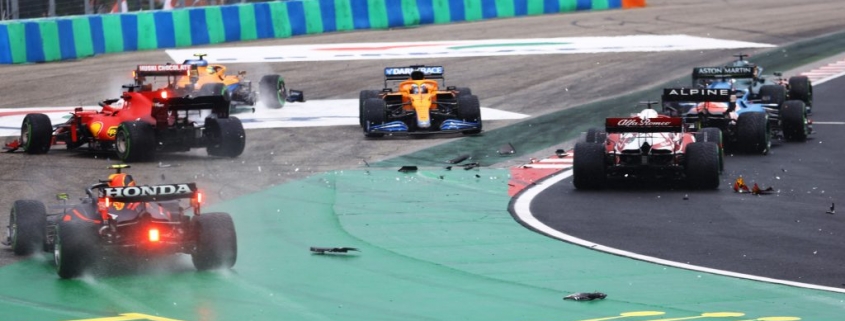Formula 1: Should the Guilty Team Have to Pay for Repairs After a Crash?
With the new budget cap in place for this F1 season, there has been a scramble to find balance. With each significant crash that takes place on the track, that repair money has to come from the overall budget. Since there have been some major crashes involving the Mercedes-AMG Petronas, Red Bull, and Ferrari Formula 1 teams, should the guilty party pay for the repairs?
Finding fault during a Formula 1 race
Autosport reported that the Ferrari team felt Mercedes should be responsible for repairs to the vehicle after the crash at the Hungarian Grand Prix. During the first corner of the first lap, Mercedes driver Valtteri Bottas triggered a significant crash. Bottas hit Red Bull driver Sergio Perez. Then Lance Stroll took out Ferrari’s Charles Leclerc.
At the Formula 1 British Grand Prix, Lewis Hamilton and Max Verstappen collided and caused around $1.8 million in damage to the Red Bull car. While the common denominator here is the Mercedes team, is it right to have the team pay for the damage? The budget cap means teams have less cash to pay for major repairs in the middle of the season.
“But I think that what we may consider is that if a driver is faulty, the team of the driver should pay at least to the other teams for the damages and repairs. That will make the drivers more responsible.”
Mattia Binotto, Ferrari team principal | Autosport
As simple as that sounds, the idea is about as complicated as one could be. Where do exemptions come in? There isn’t always a clear-cut answer to who is guilty in a crash.
The new Formula 1 budget cap complicates things
After Hungary, both the Red Bull Racing cars were left severely damaged by Bottas. In this situation, Mercedes would have to pay to fix both of the vehicles. That would eat up a lot of cash from one incident. Christian Horner, the Red Bull Racing team principal, finds the situation unfair. His team is now responsible for rebuilding two cars when the Mercedes car was the catalyst to the damage. Horner says the team is already almost at the $145 million budget cap.
“It’s brutal under the cost cap. I think it re-affirms that when you have an incident, that isn’t your fault, that we’re paying a significant price for that, and that’s something that isn’t budgeted for,” Horner said.
When it comes down to it, the money for these repairs has to come from somewhere. Horner commented that it is sometimes spare parts and spare engines that the Formula 1 team will not have.
It is a nice idea in theory, but impossible to put into play
On paper, making the guilty Formula 1 party pay for damage seems like an easy solution. It also sounds like it could cause a lot of extra time while the marshalls and the FIA decide who is guilty and who is not guilty. Sometimes, it isn’t clear who is at fault. Will it come down to a percentage? Mercedes has to pay 75% of the repair bill due to being primarily at fault?
Perhaps the idea could be that damage that takes place during an official race is not counted toward the budget cap? But at that point, what is the benefit of having a budget cap in place at all? The bigger Formula 1 teams like Mercedes, Red Bull, McLaren, and Ferrari have more money than the rest. These teams wouldn’t have any issue paying for repairs. However, the smaller teams don’t necessarily have the cash to pay for repairs, budget cap, or not.
The point of the budget cap was to make the playing field more even for all of the teams. This mainly meant that the larger teams didn’t have a neverending budget to make the cars faster and more powerful. If a budget cap means each team pays for repairs on the two team cars only, is there a more fair way to do it?
Making a smaller team pay for repairs on one of the larger team’s repairs is an excellent way to bankrupt a team entirely. It seems that allowing Formula 1 teams to repair vehicles with non-self-inflicted-damage without impacting the budget cap is a solid idea. Still, again, it is not a perfect solution.
RELATED: The McLaren Formula 1 Car Is Making Improvements to Take on Mercedes
The post Formula 1: Should the Guilty Team Have to Pay for Repairs After a Crash? appeared first on MotorBiscuit.








